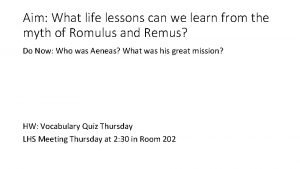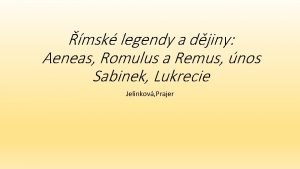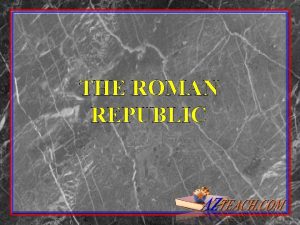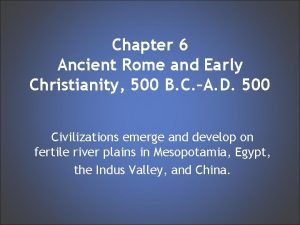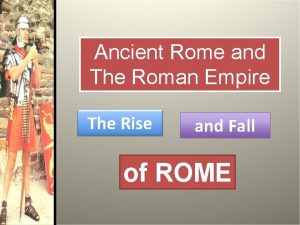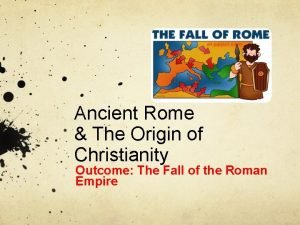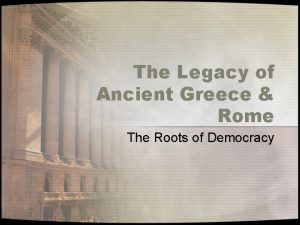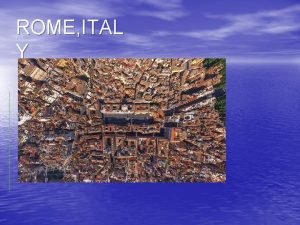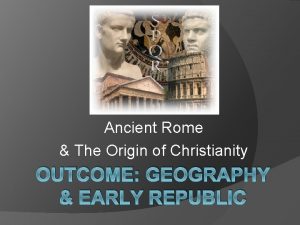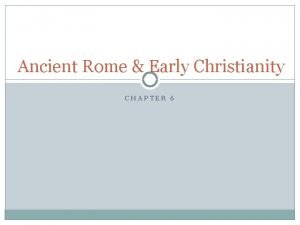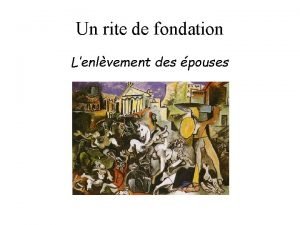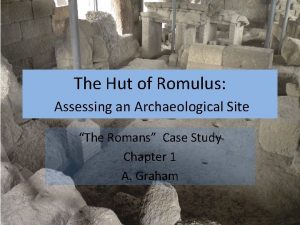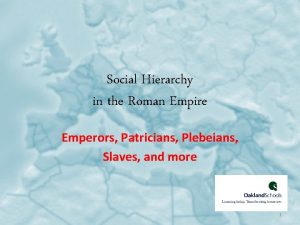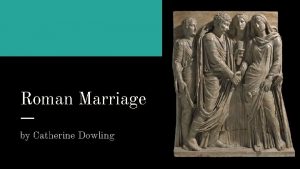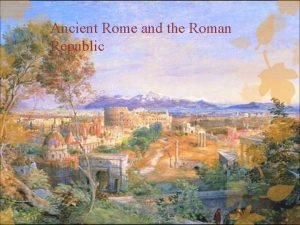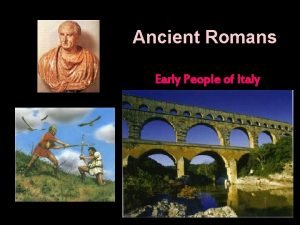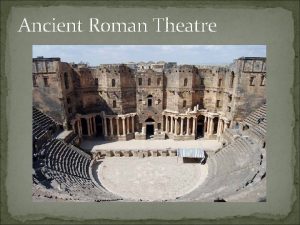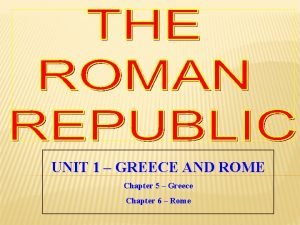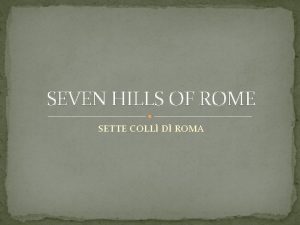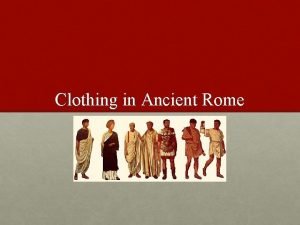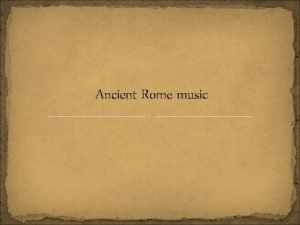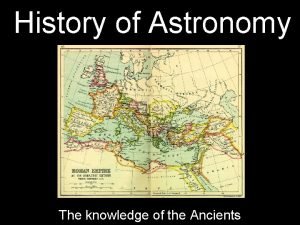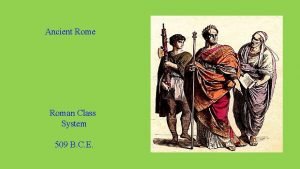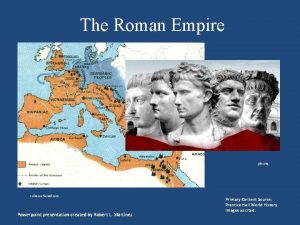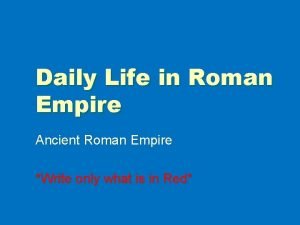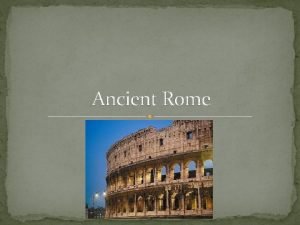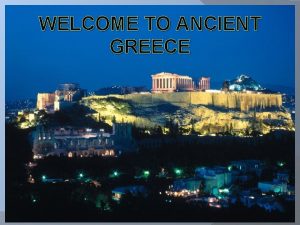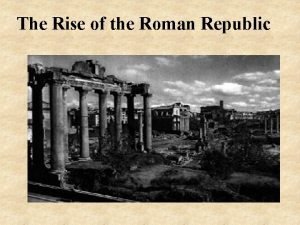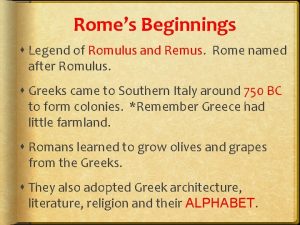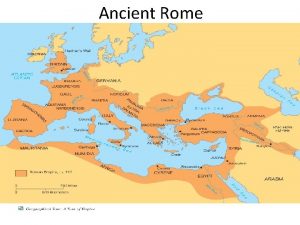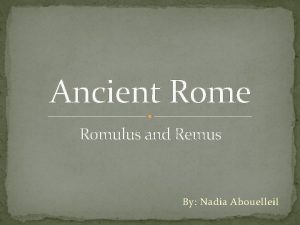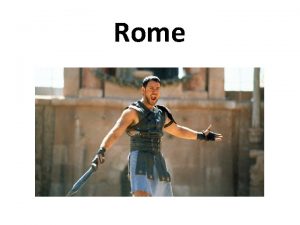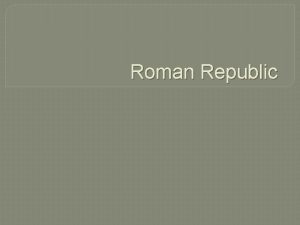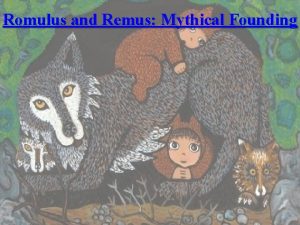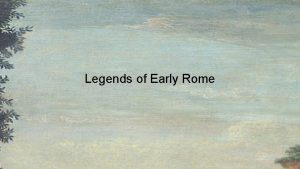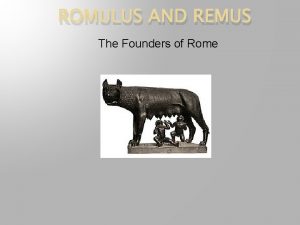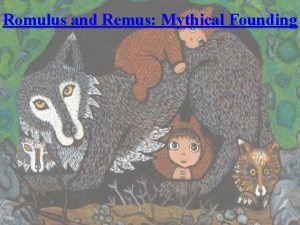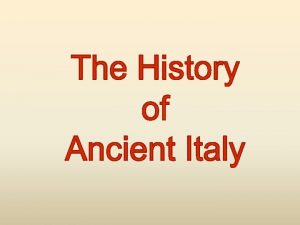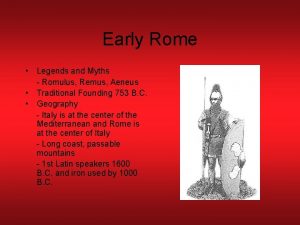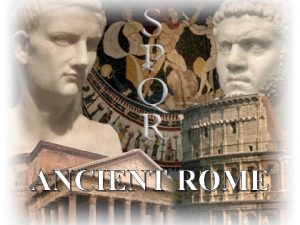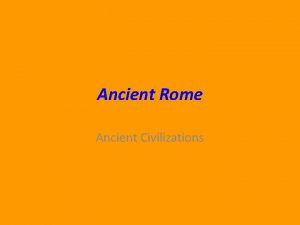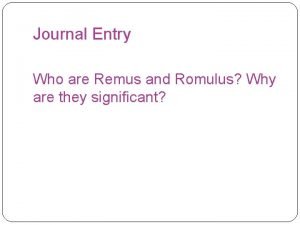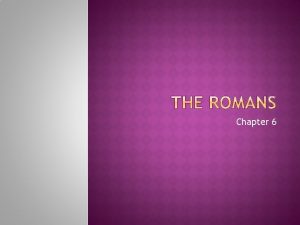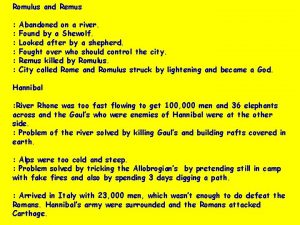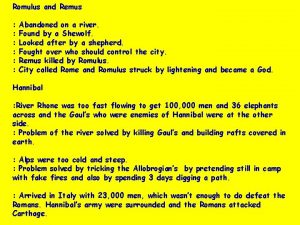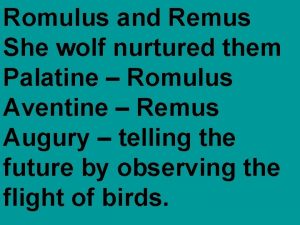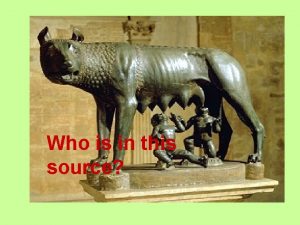Ancient Rome Romulus and Remus The legend of







































- Slides: 39

Ancient Rome

Romulus and Remus The legend of Romulus and Remus Rhea was married to Mars, the Roman god of war. Rhea had twin sons. She loved her boys, but there were plots afoot by other gods and goddesses to harm her father, herself, her husband, and her children. To protect the boys, she set them adrift on the river, hoping someone would find them. Sure enough, first they were found by a she-wolf who fed them. Then a shepherd and his wife adopted the boys. As the twins grew older, they decided they did not want to take care of sheep. They wanted to be kings. They decided to build a city on the shores of the Tiber. They both wanted to be the only king. They quarreled. In a fit of rage, Romulus picked up a rock, killed his brother, and made himself king. That’s how Rome started

Italian Geography Italy: Peninsula surrounded by the Mediterranean Sea Protection and transportation Northern border protected by Alps (mountains) some protection soil and climate able to support population growth

Italian Geography

Founding Rome founded by Latins Founded on the Tiber River- easy access to the Med. Sea and trade routes

Roman Government Rome established a Republic- gov't controlled by elected officials of the state

Patricians and Plebeians Patricians Plebeians wealthy or elite in Roman society members of the lower classes owned property renters of property from Patricians elected members of their own clans to be representatives in Roman government refused military assistance to the Patricians until changes were made in government urged for creation of a plebeian assembly chose Tribunes to represent Plebeians in government gained power of veto Forced patricians to create a written law (12 Tablets)

The Law of Twelve Tables Law posted in the Roman Forum (central area of town) Laws written on 12 Bronze Tablets Allowed for protection against secret laws or rulings by opinion of Judges

Roman Republican Government Patricians and Plebeians worked together to create a constitution (written structure of government and laws)

Roman Republican Government Divided government into three sections: 1) the Senate: had 300 members responsible for money foreign affairs reviewed laws advised officials

Roman Republican Government 2) Assemblies and Tribunes Responsible for: approving laws electing Judges court cases war

Roman Republican Government 3) Magistrates Responsible for: leading the army acting as judges and priests issuing laws

Roman Republican Government Included a system of Checks and Balances: kept each part of the government balanced and limited 2 Consuls + other magistrates Senate Assembly of Tribes Tribune Directed government and army Acted as judges Could issue edicts Acted as chief priest Controlled state budget Could pass laws Approved/rejected laws Decided on War Tribune could veto actions of magistrate Acted as final court Basis of power: possess imperium, the right to rule need for leadership Basis of power: members were richest men in Rome. Basis of power: provided most of the soldiers Limits on power: one year term each could veto Limits on power: could not control army needed majority as soldiers. Limits on power: Could not suggest laws often paid as clients by the elite

Roman Expansion Roman population grew so they needed more land Began to conquer neighboring lands

Roman Expansion Rome conquered Southern Italy forced Roman military to occupy areas but allowed for tolerance of cities practices

Conquering Greece Rome allied with Greece to fight Persia and Macedonia Rome gained Greece as a province to protect it Romans adopted many parts of Greek culture

Greek and Roman Religion Romans adopted Greek gods and goddesses but gave them Roman names: Zeus / Jupiter Hera / Juno Poseidon / Neptune Hades / Pluto Ares / Mars Hermes / Mercury Apollo / Apollo Athena / Minerva Aphrodite / Venus Eros / Cupid

End of the Roman Republic Roman land had outgrown the control of its government Unrest led by Tiberius and Gaius Gracchus brothers redistributed land to small farmers, upper class landowners saw this as a threat Senate ordered the brothers killed

End of the Roman Republic Military changes: Military became open to men that did not own property, led to more control of Generals realized they could have more power in gov't if they controlled a larger military

End of Roman Republic Civil War: War between two military commanders Gaius Marius vs Lucius Cornelius Sulla won and established a dictatorship in Rome

Beginning of Roman Empire The First Triumvirate: Three men that controlled the Roman Government 1. Julius Caesar-military leader 2. Gnaeus Pompey-military leader 3. Licinius Crassus-wealthy man

Roman Empire The First Triumvirate: Crassus died leaving power between Pompey and Caesar and Pompey fought for control of gov't Caesar won-named dictator for life in 44 BC

Julius Caesar: During his rule he gave land to soldiers and extended Roman citizenship to more people Senate became worried Caesar would make himself King, so they killed him in Senate

Second Triumvirate After Caesar's death his adopted son Octavian ruled with Marc Antony and Lepidus died-Octavian and Marc Antony split the Roman Empire and fight Octavian Wins: Becomes leader of Rome

Roman Empire under Octavian Senate gave Octavian the name "Augustus" is a religious title meaning revered one

Augustan Age Government divided between Augustus and Senate Empire: brought peace to Spain and Gaul (France) Religion: Restored temples to Gods and built new ones

Augustan Age Rome: rebuilt Rome, created police force and fire rescue Provided surplus of food and water

The Pax Romana "Roman Peace" Augustus (27 BC) - Good Emperors 180 AD Period of stable government and imperial growth Gov't the same throughout the empire

The Pax Romana Trade expansion: Traded supplies from different regions of the empire.

Roman Culture Entertainment: Circus Maximus (chariot race track)

Roman Culture Gladiators: entertainment for Roman society Included wild animals fighting professional fighters or criminals sometimes slaves fought each other to the death (for Roman Entertainment)

Roman Legacy Science: Ptolemy: Astronomy, said Earth was the center of the Universe

Roman Legacy History: Pliny the Elder gave account of the eruption of Mount Vesuvius (Pompeii)

Roman Legacy Engineering: Romans developed city planning, sewage, and ways to bring water to cities (Aqueducts)

Roman Legacy Math: development of Roman Numerals

Fall of Rome Problems: 1. Weak leaders- military dictatorships 2. economic decline- merchants couldn't ship products because of crime rates Without profit taxes increased and value of money decreased

Fall of Rome Solutions: 1. Diocletian: Roman ruler Split Roman Empire into two sections- East and West created a State-run society- everything produced was for the government

Fall of Rome Constantine: Ended Civil War after Diocletian ended his rule Moved the Eastern Roman Capital to Constantinople (Byzantine)

Fall of Rome Western Rome did not have a strong leader Was invaded by Germanic tribes being pushed by a Asian tribe (Huns and Attila) Western Roman Empire crumbled to Barbarian leader Odoacer.
 Romulus and remus moral lesson
Romulus and remus moral lesson Aeneas film
Aeneas film Romulus legend
Romulus legend Chapter 6 ancient rome and early christianity
Chapter 6 ancient rome and early christianity Philosophy of physical education in greece
Philosophy of physical education in greece Roman road
Roman road Ancient rome and the origins of christianity
Ancient rome and the origins of christianity The legacy of ancient greece and rome
The legacy of ancient greece and rome Physical geography of rome
Physical geography of rome Ancient rome outcomes geography and early republic
Ancient rome outcomes geography and early republic Ancient rome and early christianity chapter 6
Ancient rome and early christianity chapter 6 Ktm 790 adventure mods
Ktm 790 adventure mods Raluk.remus
Raluk.remus Remus dorobantu
Remus dorobantu Remus exhaust installation instructions
Remus exhaust installation instructions Remus software
Remus software Remus-sebring group
Remus-sebring group Jubet latin
Jubet latin Romulus hut
Romulus hut Romulus decem et octo
Romulus decem et octo Social hierarchy of rome
Social hierarchy of rome Marriage in ancient rome
Marriage in ancient rome Ancient google earth
Ancient google earth Geography of ancient rome
Geography of ancient rome The etruscans lived in the area known as _____.
The etruscans lived in the area known as _____. Ancient roman theatre history
Ancient roman theatre history Ancient rome tiber river
Ancient rome tiber river Seven hills of ancient rome
Seven hills of ancient rome School of litterator
School of litterator Ancient rome children's clothing
Ancient rome children's clothing Ancient rome dance
Ancient rome dance Ancient rome jeopardy
Ancient rome jeopardy Astronomy in ancient rome
Astronomy in ancient rome Ancient rome class system
Ancient rome class system Pbs roman emperors
Pbs roman emperors Roman empire family life
Roman empire family life Essnet qsr
Essnet qsr What advantages did the tiber river provide
What advantages did the tiber river provide Abcs of ancient rome
Abcs of ancient rome Patricians ancient rome
Patricians ancient rome
